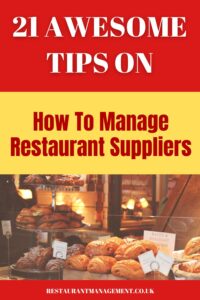How To Manage Restaurant Suppliers
Managing restaurant suppliers can feel like juggling flaming knives while riding a unicycle. But fear not! With some strategic planning and savvy negotiating, you can transform this chaotic circus into a well-oiled machine. Let’s dive into the nitty-gritty of how manage restaurant suppliers and ensuring your establishment runs smoother than a perfectly seared scallop.

21 Awesome Tips: Manage Restaurant Suppliers
1. Planning
Effective supplier management starts with meticulous planning. This phase involves defining your needs, setting clear expectations, and establishing a solid framework for ongoing relationships.
2. Supplier Accountability
Accountability is critical when dealing with suppliers. Make sure each supplier knows precisely what is expected of them. Create a detailed agreement that includes delivery schedules, quality standards, and pricing. Hold regular review meetings to discuss performance and address any issues. Keeping your suppliers accountable ensures they deliver consistent quality and timely shipments.
3. Select Reliable Suppliers
Choosing suitable suppliers can make or break your restaurant’s success. Look for suppliers with a proven track record of reliability and quality. Don’t just go for the cheapest option; focus on value. Reliable suppliers might cost a bit more, but the peace of mind they offer is priceless. Check references, read reviews, and even visit their operations.
4. Enhanced Supplier Relationships
Developing strong and enduring relationships with suppliers can result in favourable agreements, prioritised service, and additional benefits. Treat your suppliers as partners, not just vendors. Maintain open communication, pay on time, and show appreciation for their hard work. A little gratitude can go a long way in fostering a positive, long-term partnership.

5. Negotiate
Negotiation isn’t just about getting the lowest price but creating win-win scenarios. Understand your suppliers’ costs and constraints and be prepared to find a middle ground. Consider long-term contracts, bulk purchasing, or flexible payment terms as bargaining chips. A fair negotiation leaves both parties satisfied and eager to continue the relationship.
6. Leverage Group Purchasing
Group purchasing organisations (GPOs) can offer significant cost savings and better terms. By joining a GPO, you can pool your purchasing power with other restaurants to get bulk discounts and more favourable conditions. It’s an excellent way to lower costs without compromising on quality.
7. How is the Supply Chain Defined
Understanding your supply chain is crucial for effective management. The supply chain encompasses all the steps from raw material procurement to the final delivery at your restaurant. Knowing how to manage restaurant suppliers will help you analyse each link in the chain to identify potential weak spots and streamline the process.
8. Inventory Management
Manage Restaurant Inventory Effectively: Effective inventory management ensures you have the right products in the right quantities at the right time. It involves tracking stock levels, predicting demand, and replenishing inventory efficiently. Inventory management ensures you have enough stock to meet demand and minimising excess that can lead to waste.
Categorise your inventory into perishable and non-perishable items, and implement a first-in, first-out (FIFO) system to ensure the oldest stock is used first. Regularly audit your inventory to identify slow-moving items and adjust orders accordingly. Consider using a sophisticated inventory management system to simplify and automate the process. Implementing this type of software can significantly reduce the risk of overstocking, stock shortages, and human errors in managing inventory.
9. Implement Demand Forecasting
Demand forecasting is predicting future customer demand based on historical data, trends, and other factors. Accurate forecasting helps you order the right amount of supplies, minimising waste and ensuring you can meet customer needs. Invest in robust forecasting tools and regularly update your data to refine your predictions.
10. Reevaluate Your Vendors and Prices
Periodically review your suppliers and prices to ensure you’re getting the best deal. Compare their performance, pricing, and terms against other potential suppliers. Feel free to renegotiate or switch suppliers if better options are available. Keeping your supplier base competitive ensures you get the best value.
11. Ensure Adequate Food Supply for Promotions
Promotions can significantly increase demand, so plan your supplies accordingly. Coordinate with your suppliers well in advance to ensure they can meet the increased demand. Consider stocking up on promotional items to avoid last-minute shortages. Effective planning ensures your promotions run smoothly and successfully.

12. Building the Relationship
Cultivating a strong and collaborative relationship with your suppliers can yield many advantages for your business. These benefits include securing more competitive prices for goods and services, receiving priority treatment and service, and negotiating more flexible and favourable terms that can contribute to your operations’ overall success and efficiency.
13. Prioritise Sustainability
Sustainability has evolved beyond a mere trend and is a vital necessity today. When selecting suppliers, it’s important to prioritise those who adhere to sustainable practices, which include minimising waste, opting for eco-friendly packaging, and responsibly sourcing their materials. Not only does this help the environment, but it also appeals to environmentally conscious customers.
14. Quality Control
Consistent Quality: Consistent quality is non-negotiable in the restaurant industry. It’s essential to establish robust quality control measures to ensure your suppliers meet your standards. Regularly inspect deliveries, conduct taste tests, and monitor customer feedback. Address any quality issues immediately to maintain your restaurant’s reputation. It’s important to maintain a close working relationship with your suppliers to ensure they fully grasp your standards and expectations. Communicate feedback regularly and address any inconsistencies promptly. A reliable quality control system can prevent issues from escalating and provide high customer satisfaction.
Exploring Future Trends and Considerations in the UK Restaurant Industry
15. Streamline the Purchasing Process
A streamlined purchasing process saves time and reduces errors. Use technology to automate ordering, track deliveries, and manage invoices. Standardise your ordering procedures and train your staff to follow them. A smooth purchasing process ensures you always have the supplies you need without unnecessary delays.
16. Engineer Your Menu
Menu engineering involves designing your menu to maximise profitability and efficiency. Use data to identify your best-selling and most profitable items and design your menu around them. Work with your suppliers to source ingredients that offer the best balance of quality and cost. A well-engineered menu can boost your bottom line.
17. Compliance with Regulations
Every restaurant must ensure compliance with food safety regulations. Adhering to these regulations is vital not only for the safety of your customers but also to avoid potential fines, temporary closures, and negative impacts on your restaurant’s reputation. Compliance is critical to maintaining trust and confidence in your customers and regulatory authorities.
18. Control Promotions
Promotions are a great way to attract customers but require careful planning. Ensure you have enough stock to meet the increased demand and coordinate with your suppliers well in advance. Monitor the promotion’s success and be prepared to make adjustments if needed.

19. Keep Track of Food Safety
Food safety is critical in the restaurant business. Establishing a strong food safety management system that complies with local regulations is important. Consistently train your staff on food safety practices and conduct regular inspections. Being proactive about food safety helps prevent problems and safeguards your customers.
20. Communication
Clear communication with your suppliers is crucial for seamless operations. Keep communication channels open and resolve any issues quickly—Utilise technology like email, messaging apps, or supplier management software to enhance communication. Consistent and transparent communication builds trust and ensures everyone is aligned.
21. Train Your Staff
Well-trained staff are crucial for effective supplier management. Train your staff on ordering procedures, inventory management, and quality control. Ensure they understand the importance of maintaining good relationships with suppliers and the impact of their actions on the restaurant’s success. Regular training keeps your team sharp and efficient.
Related articles:
Commercial Kitchen Equipment Suppliers
Restaurant Kitchen Management: A Guide To Being The Best In Your Field
Conclusion
Effectively managing restaurant suppliers may appear overwhelming, but by implementing meticulous planning, maintaining transparent communication, and prioritising the development of strong partnerships, you can establish a seamless and efficient supply chain. Prioritise reliability, sustainability, and quality, and don’t be afraid to negotiate and reevaluate your options. By mastering how to manage restaurant suppliers, you’ll set your restaurant up for success and keep your customers returning for more.
FAQs
- How can I ensure my suppliers meet my quality standards?
To ensure suppliers meet your quality standards, implement strict quality control measures. Regularly inspect deliveries, conduct taste tests, and solicit customer feedback. Clearly communicate your standards to your suppliers and hold them accountable.
- What should I do if a supplier consistently fails to meet expectations?
In cases where a supplier does not consistently meet expectations, it’s essential to address the issue directly with them. Discuss the problems and try to find a solution. If the issues persist, consider finding a new supplier who can better meet your needs.
- How often should I review my supplier agreements and prices?
Review your supplier agreements and prices at least once a year. Regular reviews help ensure you’re getting the best value and allow you to renegotiate terms or switch suppliers if necessary. Frequent reviews can also help identify any issues early and maintain strong supplier relationships.


